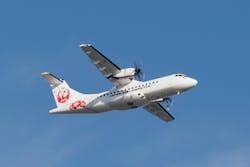Japan Air Commuter Starts Operations With ATR
Toulouse, April 26, 2017 – Japan Air Commuter Co. Ltd. (JAC) performed its first ATR 42-600 flight today. JAC’s flight 3741 departed from Kagoshima at 8:50 am (local time) for a 40-minute flight to Yakushima. The aircraft then performed three flights, from Yakushima to Kagoshima, from Kagoshima to Okinoerabu, and back to Kagoshima.
A subsidiary of Japan Airlines, the national flag carrier, JAC therefore becomes a new ATR operator. The entry into service of JAC’s first ATR is a major milestone for ATR, for which Japan is a key market.
Japan is preparing for a huge influx of tourists. Its government hopes to welcome 40 million visitors by 2020. In addition to hosting major events such as the Rugby World Cup in 2019 and the Olympic Games in 2020, Japan is promoting the natural beauty and cultural heritage of its regions.
Prior to the official petitioning for the UNESCO World Natural Heritage in 2018, the Amami islands have been designated as a national park as recently as March. A successful designation as a world natural heritage will boost the tourism potential of the region, as the already famed Yakushima is located in the neighbouring area. These Natural Heritage candidate islands will all be served by ATRs to ensure connectivity for a growing number of foreign tourists. As 35% of Japanese domestic routes are below 300 nm, ATRs are optimally suited to further develop regional connectivity.
The brand-new ATRs will be operating on connections from and to small islands and communities across the country. The specific features of the Japanese market demand flexible, cost-efficient, high quality and technologically advanced aircraft, all characteristics that ATRs fully match.
ATR 42-600s also have the world’s lowest energy consumption in terms of consumption per passenger and per kilometre. ATR has a strong commitment to mitigate the environmental impact of the commercial aviation sector and focuses on constantly improving its aircraft to meet the highest environmental standards. These green credentials are key in attracting sales in environmentally conscious markets, and Japanese passengers are known to be among the most cognisant and demanding travellers about environment and excellence.



